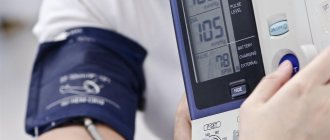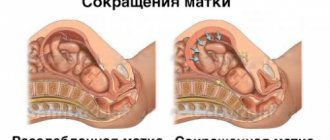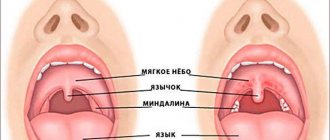Many women sincerely believe that regular blood pressure measurement at routine appointments is necessary in order to detect elevated levels in a timely manner.
Almost everyone knows that an increase in blood pressure during this period is dangerous for the health of the mother and child.
Low blood pressure during pregnancy is not considered important and is even considered absolutely safe. Meanwhile, the doctor is also alarmed by too low numbers, because this can also negatively affect the course of pregnancy.
Blood pressure norms during pregnancy
It is generally accepted that high blood pressure poses a direct threat to women's health and affects the process of childbirth. It is believed that normally it should not exceed 140/90. For women, blood pressure is considered low if the high (heart) reading falls below 100 and the low is equal to or below 60.
The state of health deteriorates very much, and this also negatively affects the condition of the fetus, so you need to monitor the indicators using a tonometer. Hypotension can occur in completely healthy women who did not consult a doctor about this problem before pregnancy. The gynecologist records deviations from the norm and, if necessary, gives recommendations on how to normalize blood pressure without medications, or prescribes drug therapy.
When the 2nd trimester begins, blood pressure that has fallen below normal affects the tone of the woman’s body. Slow blood circulation in the area of the uterus and placenta stops the formation of the embryo. Low blood pressure during pregnancy in the second trimester can be observed during night and daytime sleep. Its changes are mainly observed in those who like to lie on their backs. The weight of the fetus compresses the vena cava, which prevents normal blood flow.
How to feel better
Most often, low blood pressure is observed during pregnancy in the 1st trimester, and what to do in this case is determined by the woman’s general well-being and the difference between the indicators and the norm. If the decrease is insignificant and there is no danger to the fetus, then the best way to correct the condition is diet and regimen. You can improve the condition on your own, but to do this you need to know for sure that there is no threat to the baby.
If low blood pressure is recorded during pregnancy in the 2nd trimester, then the doctor determines what to do. The same applies to later dates. The doctor selects treatment tactics based on the causes of hypotension. There are two options: either drug-free correction or drug therapy.
General recommendations
Having felt a general malaise associated with low blood pressure, the expectant mother can improve her condition with the help of simple and safe manipulations. It will help those with hypotension:
- Rest. At the first signs indicating a surge in blood pressure, it is advisable to put everything aside and rest. Sometimes it is enough to sleep for an hour for the indicators to return to normal. You can not sleep, but just lie quietly. It is recommended to place a low cushion under your feet to allow blood to flow from the bottom to the top.
- Fresh air. A walk in the fresh air will help improve your well-being. But if you feel very dizzy and there is a risk of fainting, then it is better to take an accompanying person for a walk. You can do it even simpler: let fresh air into the room and lie quietly.
- Cold and hot shower. Alternating hot and cold water stimulates blood circulation. Naturally, temperatures should not be extreme.
- Black chocolate. If your eyes darken and your head starts to spin, you need to eat a couple of pieces of dark chocolate. The product must contain at least 70% cocoa. If you don't have a tile at hand, you can drink a cup of sweet tea.
- Acupressure. To normalize the pressure, it is recommended to massage the point between the nose and upper lip. The second option is to rub your little finger at the base of the nail.
- Breathing exercises. Exercise normalizes blood pressure. But they need to be done correctly. To do this, it is better to consult a specialist.
General recommendations will help in any trimester, but only if there are no severe symptoms and the condition is not caused by a serious illness. Expectant mothers should not get out of bed abruptly, they need to walk more, get enough sleep, avoid stress, then the pressure will return to normal.
You can increase your blood pressure with diet. Its main principles are a complete and balanced diet with an emphasis on foods that normalize blood pressure. If you are pregnant, you should follow these recommendations:
- You need to eat often and in small portions. Feelings of hunger should not be allowed.
- Before getting out of bed, it is recommended to have a snack of fruit or dry biscuits. A snack should be left on the nightstand in the evening.
- When creating a menu, you should focus on complex carbohydrates (cereals, bran) and proteins (meat, cottage cheese, eggs, fish).
- The diet should definitely include seasonal fruits, berries, and vegetables. In winter, they will be replaced by vitamin complexes, but they must be selected by a doctor.
- You should eat beets, celery, strawberries, herbs, and dried fruits. These products bring blood pressure back to normal.
Particular attention should be paid to the drinking regime. When the body receives fluid in sufficient quantities, the likelihood of a malfunction is lower.
Since it is not advisable to drink coffee during pregnancy, a chicory drink will help you cheer up.
Traditional methods
Traditional medicine methods will help an expectant mother who has low blood pressure feel better. However, you should consult your doctor about the possibility of their use. This is especially true for herbal preparations: active plant components can harm the baby. The safest methods are:
- Hibiscus tea. To prepare a tonic drink, you need to pour 500 ml of boiling water over five inflorescences. The tea is steeped for 20 minutes. The norm per day is three cups. You can add honey.
- Kalina. The berry is also used for high blood pressure, so hypotensive patients need to know the correct recipe. Grind a handful of berries, pour 500 ml of boiling water over them and leave for an hour. Then strain, squeeze the juice from the berries and drink a healthy drink of 120 ml per day.
- Hare cabbage. This medicinal plant is brewed as tea, infused for 2 hours and taken approximately 50 ml before meals.
What pressure is considered low?
According to gynecologists, during pregnancy, a slight deviation can be considered the norm, since it is triggered by hormonal changes. Normal blood pressure during pregnancy is 140/90. If it falls below 90/60, then this condition definitely requires correction.
A slight decrease forces pregnant women to adhere to a more measured life, rest more, and not overload themselves physically and emotionally. In the absence of complaints and in good health, there is no particular cause for concern, but it is imperative to monitor the condition of the fetus. A cause for concern should be the poor health of the mother, which is accompanied by the following complaints:
- frequent headaches;
- feeling of weakness and drowsiness;
- shortness of breath and rapid pulse;
- dizziness;
- increased sweating.
In a hypertensive patient, similar symptoms can be observed already at a value of 120/80, so it is impossible to establish general criteria for all women bearing a child. A decrease in upper pressure from the normal level by 10 units is considered a cause for concern.
Increased blood pressure in early pregnancy
Typically, high blood pressure during early pregnancy manifests itself in the following:
- Fatigue, weakness.
- Headache, which can be squeezing and bursting.
- Increased sweating. Due to the change, more sweat is produced, not only from the armpit.
- Ringing and unpleasant noise in the ears and head.
- Problems with vision, impairment or changes.
- Dark spots, spots before the eyes.
- Uncharacteristic heartbeat, including the occurrence of tachycardia.
- Nausea, lethargy.
- Swelling of the legs and throughout the body.
The list may include other symptoms that are individual in nature. Doctors call increased blood pressure in early pregnancy hypertension. This term is used not only for expectant mothers, but also for any other patients whose indicators deviate from the norm and are elevated. If the pregnant woman had them before conception and brought discomfort, then the problem lies deeper - in chronic processes and diseases.
But sometimes elevated levels are normal if this is due to the individual characteristics of the body. It is in this case that a person feels good and does not experience discomfort when carrying a child. But in any of the above cases, you should come for an examination to a doctor and report the problem.
The generally accepted figure is 80 to 120, but this may not be the norm for many people. For example, a woman had lower levels (60 to 90), which were established as the norm, for several years. If in the early stages there is a deviation upward by 15-20 percent or more, then this is also a reason to contact a specialist.
It could also be hypertension, since the numbers are uncharacteristic for a particular patient. If symptoms with dizziness, headache and other signs are observed, then hypertension may indeed be observed in the first trimester. An increase in patients with a norm of 80/120 (+/- 10-15%) can be recorded if the numbers on the tonometer exceed the value of 90/140. If the numbers jump within 10-15% of the norm, then this may be a consequence of the following factors:
- Physical work, high fatigue.
- Stress, increased emotionality.
- Poor nutrition or the inclusion of certain foods in the diet that increase blood pressure. Insufficient drinking water or high salt content in foods can also play a big role.
- Lack of oxygen and fresh air.
- Lack of magnesium and other beneficial substances in the body.
- Other factors.
With hypertension, narrowing of blood vessels occurs. Blood flows under higher pressure due to the narrowed lumen. It is more difficult for it to reach the placenta and embryo, so the processes of its normal growth and development are disrupted. Sometimes such disorders can lead to miscarriage, placental insufficiency, hypoxia and other adverse consequences. With hypertension, the treating gynecologist pays more attention to the patient than with hypotension. This is associated with the threat of miscarriage, possible placental abruption and bleeding.
Sometimes high blood pressure during early pregnancy can be accompanied by preeclampsia. Then the woman begins to rapidly gain weight, which is why fetal rejection is possible. In this case, it is necessary to undergo tests, including to determine the amount of protein in the blood. It is important not to neglect your health in the early stages, since hypertension can be a symptom of a concomitant disease:
- Hepatitis.
- Kidney disease or adrenal dysfunction, including pyelonephritis, as well as glomerulonephritis.
- Diseases of the gallbladder and ducts, dyskinesia.
- Diabetes.
- Thyroid dysfunction.
- Previous head injuries.
- Other diseases, which may be chronic, occurred before pregnancy.
Therefore, a woman should not only come to the appointment, but also undergo an examination and pass all the necessary tests. This way you can avoid these adverse consequences. Self-medication, folk remedies and herbs are excluded. They can only worsen the situation and harm the fetus. Only a doctor can prescribe the correct course if he considers it necessary. Sometimes the problem can be solved by changing your lifestyle and diet:
- Proper nutrition, reducing the amount of salt, sugar, seasonings, fats.
- Weight adjustment.
- Correct emotional state: avoiding stress.
- Walking or frequent exposure to fresh air.
- Permissible sports: yoga and swimming for pregnant women, breathing exercises.
You should not take medications that will lower blood pressure or are contraindicated for pregnant women. Also, taking medications that eliminate symptoms does not treat the root cause or the disease itself. For example, for headaches from hypertension, women can use painkillers. The list of medications or treatment should be coordinated with your gynecologist.
Main causes of hypotension
The main cause of low blood pressure during pregnancy in the second trimester is considered to be hormonal changes. A woman’s body is under a kind of stress, and a very serious restructuring is taking place. In addition, there may be other reasons for decreased blood pressure in a pregnant woman, among which the following factors should be highlighted:
- stress, emotional overstrain;
- lack of sleep;
- non-compliance with diet;
- unbalanced drinking regime.
In addition to physiological reasons, the occurrence of hypotension can be affected by a woman’s general well-being. Low blood pressure during pregnancy in the second trimester is generally considered a dysfunction of the body. In addition, it may be a manifestation of illness. Such problems include the following violations:
- pathologies of the cardiovascular and endocrine systems;
- kidney and adrenal diseases;
- dysfunction of the gastrointestinal tract;
- infectious diseases.
Hypotension can occur with prolonged exposure to the sun or in a stuffy room, prolonged standing, and changes in weather conditions.
Causes and symptoms of low blood pressure
The exact cause of low blood pressure in a pregnant woman can only be determined by a doctor after an examination. They are divided into two main groups: pathological (when the cause lies in the disease) and physiological (the cause is external factors).
Physiological are:
- hunger;
- being in a stuffy room;
- overwork;
- lack of sleep;
- hard physical work;
- stress.
In these cases, the woman’s condition requires symptomatic treatment. Often it is enough to drink a cup of strong tea and relax a little.
Pathological ones are:
- cardiovascular failure;
- blood loss;
- hormonal disorders in the body;
- uncontrolled use of certain drugs. Diuretic tablets (Canephron, Furamag, etc.) especially often reduce blood pressure;
- congenital defects of the structure of the heart and blood vessels (in women);
- polyhydramnios;
- severe toxicosis.
Symptoms
Hypotension mainly occurs in the first half of pregnancy, and may go away after the blood volume in the body increases and the woman does not suffer from toxicosis. If this is an independent disease, then it can occur in 3 stages, namely:
- compensated;
- subcompensated;
- decompensated.
Sustained or compensated hypotension is characterized by the fact that blood pressure levels in women can remain at the upper limit of normal. She has no symptoms of illness or disease.
Unstable or subcompensated hypotension is characterized by the fact that the pressure drops below normal by 5-15 units. The woman begins to feel weak and drowsy. Dizziness, headache, and arrhythmia also appear. The woman becomes absent-minded and complains about her memory. Her feet and hands may be cold. It happens that severe dizziness appears, blurring before the eyes, and there may even be fainting when changing body position.
With decompensated hypotension, the woman’s condition is very serious. The pregnant woman sleeps very poorly, her fingertips turn blue, and she often faints. Hypotonic crises are often observed. A woman cannot live a normal life and work.
In case of low blood pressure during pregnancy in the second trimester, the following symptoms are observed:
- forgetfulness;
- headache;
- lethargy;
- increased drowsiness;
- absent-mindedness;
- passivity.
If such symptoms occur, you should definitely consult a doctor for a comprehensive diagnosis and subsequent treatment.
Low blood pressure during pregnancy symptoms
A decrease in blood pressure in pregnant women, in comparison with the values before the “interesting situation,” is considered to be a normal phenomenon that is typical for many expectant mothers; low blood pressure is a sign of pregnancy. Doctors call this phenomenon physiological hypotension in pregnant women. With a sharp drop or decrease in pressure, women may feel unwell, which manifests itself:
dizziness, headache, sometimes fainting; women feel pulsation in the temples or the back of the head; Nausea, weakness, decreased performance may appear, drowsiness and fatigue may occur; there are frequent cases of tinnitus, darkening and ripples in the eyes; the expectant mother has sudden mood swings, trembling hands and legs, and increased sweating; the woman becomes weather dependent and reacts to any weather changes; memory and attention deteriorate; feeling of discomfort, pain in the heart area, arrhythmia, rapid pulse.
If the above symptoms are present, the expectant mother must see a doctor.
Features of treatment
If you have low blood pressure during pregnancy in the second trimester, only your doctor can tell you what to do, since sometimes the condition can be critical. The following conservative measures are often taken:
- correction of diet;
- change in daily routine;
- protection from stress;
- physical education class.
It is important to consume foods that increase or normalize blood pressure. You need to eat as often as possible, in sufficient quantities. At the same time, food should be varied.
A pregnant woman should sleep at least 8 hours a day at night. It is also important to avoid overwork at home and at work. That is, rest should be sufficient and sleep complete.
The people around her should protect the pregnant woman from stress, but at the same time, she herself must understand that unnecessary worries will not benefit either her or the child. It’s best to learn to look at things more calmly and ignore some points.
A pregnant woman should pay enough attention to increasing vascular and muscle tone. Light physical activity and walking will help enrich the blood with oxygen, lift your mood and normalize your well-being.
General factors
A direct indicator of heart function and heart rate is the arterial phenomenon, and it has two main components:
- upper pressure (systolic) is an indicator of the contraction of the heart with maximum work;
- lower pressure (diastolic) is an indicator of the contraction of the heart when it is in a relaxed state.
So why does blood pressure drop in pregnant women? In the first three months, when the body is just adapting to the new state, along with a drop in pressure, other signs of toxicosis occur: dizziness, nausea, vomiting, weakness, drowsiness.
This can easily be solved by proper nutrition, spending time in the fresh air, and reducing physical and mental stress. As for nutrition, doctors recommend eating little by little and eating home-cooked food, rather than eating dry sandwiches.
It is necessary to include slightly salty foods and sour fruits in your diet. That is, we woke up in the morning, drank some water with lemon juice and everything was in order. This is a great way to defeat weakness caused by getting out of bed at night and hunger. But be careful: if you have had gastritis or experience discomfort from salty and sour foods, then this method is not suitable for you. That's why consulting a doctor is your very first action. Read more in our other article about blood pressure in the first trimester.
But what to do when blood pressure drops in the second trimester, when the peak of toxicosis is behind us? Low blood pressure in the second trimester is dangerous not only due to the poor health of the expectant mother, but also due to the lack of oxygen for the fetus, because it is initially necessary to meet its needs and then give it to the child. This is a natural factor.
Drug therapy
Often, hypotension can be treated at home, but if the doctor prescribes drug therapy, then this means that the matter is serious. A pregnant woman should register with a therapist and neurologist.
If a woman tolerates medications normally, without allergy symptoms or other unpleasant body reactions, then the doctor prescribes medications that can normalize blood pressure. However, only the attending doctor must prescribe them, since a negative effect on the fetus is possible.
To increase blood pressure, Dopegit is often prescribed. This drug provides maximum results and also normalizes surges almost immediately. The medicine acts as a prophylactic agent, normalizes a woman’s well-being, fights hypotension, and does not interfere with the normal development of the fetus.
Many people are interested in why Dipyridamole is prescribed during pregnancy. This is a very good remedy that helps dilate blood vessels, it is recommended for normalizing blood circulation. However, it is not enough to know why Dipyridamole is prescribed during pregnancy, since it is very important to choose the right dosage. Only a doctor can determine this after an examination.
The drug "Pantocrine" contains an extract of deer antlers. This medicine has a positive effect on the nervous system and has a good effect on blood vessels. Literally after a couple of weeks of using it, your health will return to normal.
Eleutherococcus tincture has proven itself quite well. Instructions for use and indications indicate that this remedy helps normalize blood pressure and does not cause side effects. In addition, performance increases, immunity is strengthened, and the woman is much less exposed to infectious diseases.
As stated in the instructions for using Rhodiola rosea tincture, this remedy is well suited for increasing brain activity, toning blood vessels and increasing overall blood flow.
The effect of hypotension on a woman and fetus
Hypotension is a consequence of hormonal changes in the body of a pregnant woman, which is dangerous, first of all, for the fetus. The provocateur of the situation is progesterone, an increase in the synthesis of which in the early stages causes fluctuations in vascular tone. The arteries tend to dilate, which in itself causes a drop in blood pressure.
The lower norm for blood pressure is 90/60, everything beyond these limits requires correction.
At the 12th week of pregnancy, low blood pressure begins to bother the woman herself, causing a deterioration in general well-being, drowsiness, tearfulness, and depression. The condition is aggravated by the fact that drugs usually prescribed for hypotension are contraindicated for pregnant women, as they can cause an unpredictable reaction in the fetus or lead to irreversible consequences for it. Only when the placental barrier becomes a protection for the embryo can we talk about symptomatic treatment of hypotension.
By the second trimester, blood pressure normally stabilizes.
Diet
Every woman who suffers from hypotension should know how to raise blood pressure during pregnancy with nutrition. Fresh berries, fruits and vegetables tone the circulatory system and improve heart function. Hypotonic people can and should consume salty and fatty foods. However, this must be done without excess. High-calorie meals will lead to rapid weight gain, and excess salt will lead to severe swelling.
Helps raise blood pressure and saturate the body with vitamins:
- black currant berries;
- apricot;
- citrus;
- bakery.
The diet must include fermented milk drinks, liver, and lean meats. Walnuts, dried fruits, and various greens are very useful for pregnant women.
If a woman likes to drink coffee, it is better not to do it often, as this drink has a diuretic effect, which can lead to dehydration. You can drink coffee with added milk. Many people are interested in what tea to drink during pregnancy in order to normalize blood pressure. It should not be strong, as caffeine can tone the uterus, which is very dangerous. It is good to consume green tea. Various jelly and compotes are also allowed. A pregnant woman should drink about 2 liters of water per day.
Celery root has beneficial properties. It is also recommended to drink tomato juice. You need to eat often, in fractional parts. At the same time, protein foods and complex carbohydrates should predominate in the diet. You need to maintain a certain interval between meals, but it is important not to go hungry, it is better to have snacks as often as possible.
Auxiliary therapy techniques
Aromatherapy can be done at home, but with restrictions. There are essential oils that are contraindicated for pregnant women in any trimester. Oils from the following plants can provoke a miscarriage and complicate childbirth:
- rosemary, parsley, cinnamon;
- oregano, tarragon, myrrh;
- lemon balm, basil, cedar, chamomile;
- thuja, anise, tansy.
To stabilize blood pressure, ylang-ylang essential oil is recommended, as it has a positive effect on the functioning of the heart and blood vessel walls. Pregnant women are allowed scents of ginger, citrus, lavender, and patchouli.
You can keep your blood pressure normal with acupressure. It can be done professionally by a specialist, and at home you can massage only 3 points. The first is on the upper lip in the hollow area, the second on the big toes, in the place where they touch the next toe. On the hands, the points that influence pressure are located on the little fingers.
Fitness classes, yoga, swimming, and breathing exercises help normalize blood pressure. If necessary, the doctor refers the woman to an examination of internal organs to clarify the diagnosis. In the absence of other pathologies, the following is prescribed:
- electrophoresis;
- massage;
- electrosleep;
- Ural Federal District.
All methods must be prescribed only by a specialist, depending on the condition of the pregnant woman and the level of pressure.
Three trimesters: what are their main differences?
If your blood pressure drops sharply during pregnancy, then what to do and what to do is decided by the doctor exclusively on an individual basis, depending on the trimester and the characteristics of the pregnant woman’s body.
The disease manifests itself in different ways:
- 1st trimester. Complications from arterial hypotension occur in such a way that in the early stages a woman risks losing her baby. Severe toxicosis begins. As a result, the doctor prescribes strict adherence to bed rest;
- 2nd trimester. Complications of the pathology at this stage are fraught with development or delay in the development of the fetus. Due to hypotension, the uteroplacental blood flow decreases, as a result, the pressure rises, which prompts the doctor to take extreme measures and prescribe additional medications to stabilize this condition of the pregnant woman;
- 3rd trimester. If the pressure drops too late, the girl may feel unwell, fetal malnutrition, and neuropsychic abnormalities in the unborn baby. Complications during childbirth and postpartum hemorrhage may also occur.
For example, if the pressure is 80 to 50, the doctor needs to immediately respond to raise it to at least 90 to 60, at a minimum. If the problem is not corrected immediately, then in the end you will have to use a cesarean section during childbirth, since the contractile activity of the uterus will be impaired.
Folk remedies
How to raise the blood pressure of a pregnant woman using alternative therapy is of interest to many women, as they are effective and safe. Only together with a doctor can you decide on the use of folk remedies to increase blood pressure.
You can drink hibiscus tea with lemon. You are allowed to consume up to 3 tbsp per day. tonic drink. Place 5 Sudanese rose flowers in a 0.5 liter porcelain teapot, pour boiling water over it and leave to brew for 20 minutes.
Viburnum berries normalize blood pressure. They need to be mashed in a mortar, then pour boiling water over them and leave to brew for 1 hour. It is recommended to drink ½ tbsp per day. drink For 0.5 liters of water you need to take a handful of ripe berries. For taste, you can add honey to the cooled infusion.
A decoction made from herbs such as hops, motherwort, mint, and lemon balm is recommended for pregnant women. All of them help normalize the nervous system and blood pressure, and strengthen the immune system.
Traditional methods
If a decrease in blood pressure in the 2nd trimester of pregnancy is not caused by any diseases, then the problem can be solved by using traditional methods of treatment. Recommended to use:
- celery root, which is added to salads;
- strawberries, which can normalize blood pressure and increase hemoglobin;
- onion broth It is prepared like this: 1 onion with peel is poured into 0.5 liters of water and simmered over low heat with 50 g of sugar. After 15 minutes the broth is ready. It needs to be cooled and drunk in small sips throughout the day. This product stabilizes blood pressure.
In addition, some tips will help keep blood vessels in good shape:
- It is not recommended to jump out of bed after waking up. You need to lie down a little, “wake up”;
- make it a rule to drink a glass of freshly squeezed juice throughout the day;
- eat a varied diet, with the obligatory inclusion of fish, meat, cottage cheese in the menu;
- consume enough salt (7-9 g per day);
- do physical exercises for pregnant women, spend more time in the fresh air;
- take a contrast shower;
- do not lie on your back for a long time. During an attack of nausea, you can raise your legs above your head and thereby ensure the flow of blood from the lower extremities to the brain;
- breathe in essential oils such as basil, rosemary;
- breathe correctly when, after inhaling and exhaling, hold your breath for 15 seconds. This method saturates the blood vessels with oxygen and normalizes blood pressure;
- You need to sleep on a high pillow.
When determining the underlying disease causing arterial hypotension, all efforts must be directed toward its treatment.
If low blood pressure is not caused by chronic diseases, then the pregnant woman does not require hospitalization
By changing your lifestyle, in which importance is given to physical exercise, walks in fresh air, sufficient time for sleep, as well as proper nutrition, you can normalize your blood pressure and thereby improve your condition
Why is low blood pressure dangerous?
This condition is very dangerous for a pregnant woman. Doctors say that hypotension cannot be ignored. Low pressure leads to the fact that blood microcirculation becomes slower, as a result of which fetal hypoxia can occur, which can provoke intrauterine growth retardation.
It has been proven that pregnant women with hypotension have a significantly increased risk of spontaneous abortion or miscarriage. Low blood pressure after the 12th week of pregnancy usually provokes a deterioration in the woman’s general well-being.
Weak blood flow causes placental insufficiency, and various abnormalities in fetal development are observed. The nutrition supplied to the baby through the placenta is not enough, so the baby may be born with pathology or underweight. Poor circulation in the pelvic area causes mild contractions. In addition, it can cause placental abruption and premature birth.
Risk to mother and fetus
This question interests all women, because the most important thing for us is that the long-awaited pregnancy ends with the birth of a healthy child. Low blood pressure affects many people. And, it would seem, you can ignore it. But it's not that simple. Blood pressure may drop even at night when the expectant mother is sleeping. This happens especially often when a woman lies on her back. The fetus compresses the vena cava and blood circulation is disrupted. In this case, the problem may be not only the poor health of the mother, but also a disruption in the development of the baby. Although toxicosis, gestosis and anemia, which are a consequence of hypotension, are unpleasant phenomena. To avoid this problem, doctors advise women to sleep on their side rather than on their back.
Reduced pressure leads to oxygen starvation of the child. Prolonged hypoxia can lead to miscarriage, slowed growth and development, and health problems after birth. The worst thing is that the child’s brain reacts first to a lack of oxygen. In addition, the baby is deprived of nutrients, which means he will grow more slowly than he could.
Carrying out prevention
To prevent a critical decrease in blood pressure during pregnancy, you need to follow certain preventive measures. It is recommended for a woman to do morning exercises, it is useful to douse with cold water, take a shower, and do contrasting foot baths.
A pregnant woman should devote enough time to sleep and rest. Outdoor walks are recommended. Fitball, dancing, and swimming help to cope well with the problem. Thanks to this, the tone of blood vessels and muscles improves. A pregnant woman is recommended to switch to easier working conditions.
It is not recommended to stand on your feet for too long, sit at the computer for a long time, make sudden movements, or ride in crowded public transport. A woman’s health during pregnancy largely depends on how well she alternates between work and rest.
Low blood pressure during pregnancy is a very common occurrence. It is very important to strictly follow all the doctor’s recommendations for its normalization, and then it will be possible to prevent dangerous consequences for the child. It is prohibited to ignore a decrease in indicators, since if the jumps are frequent, this poses a threat to the fetus and mother.
Causes and symptoms of the condition
Low blood pressure and high pulse are a natural process that plays an important role in the formation of new vascular networks. This state is even considered more beneficial for the body. If a pregnant woman constantly feels like this, then this can be the cause of serious illness. For example, this indicator can drop sharply with peptic ulcers, as well as with various infectious diseases and allergies. In addition, hypotension during pregnancy sometimes occurs due to adrenal insufficiency and other diseases. Therefore, it is imperative to inform your doctor if a woman has such problems.
Pressure decreases for the following reasons:
- increased progesterone in the blood;
- polyhydramnios, carrying twins;
- iron deficiency anemia;
- inferior vena cava syndrome;
- endocrine pathologies, cardiovascular diseases;
- stressful situations, sedentary lifestyle;
- non-compliance with nutritional rules;
- non-compliance with drinking regime;
- sudden changes in weather conditions.
Hypotension in pregnant women can manifest itself in different ways. The 2nd trimester is accompanied by nausea, severe and constant weakness. In addition, during the period of bearing a child with low pressure, drowsiness, fatigue, dizziness, ringing and tinnitus occur. The 3rd trimester will be accompanied by a sharp darkening of the eyes, a feeling of lack of fresh air and even frequent fainting.











